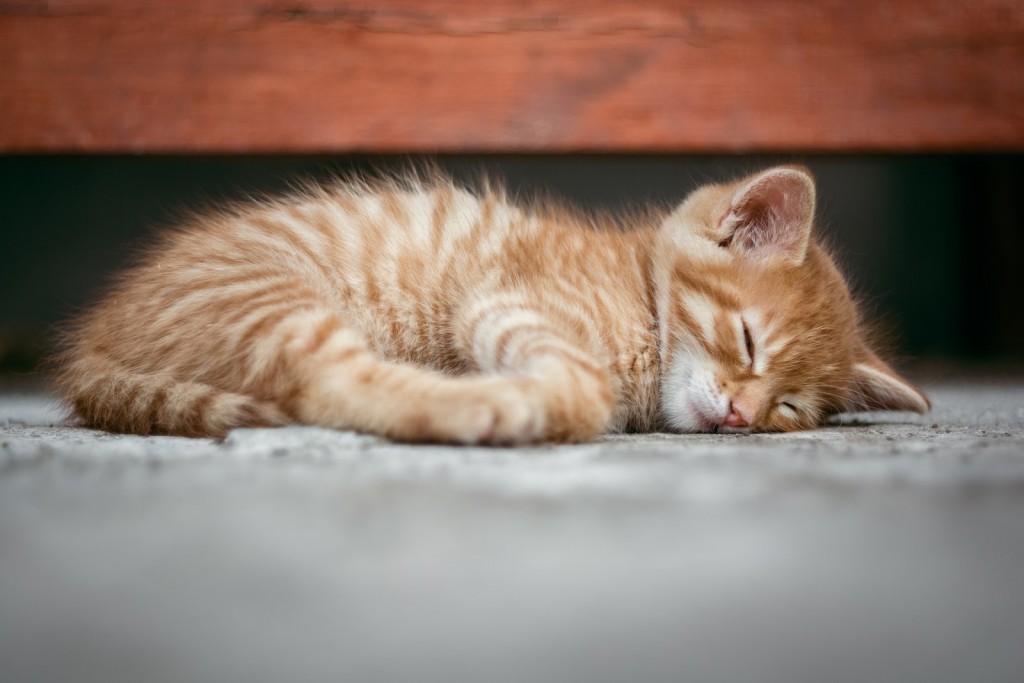It's not uncommon for kittens to vomit, but it can also be a sign that the kitten is sick. To better understand why it's not dangerous for a kitten to vomit, let's find out why kittens vomit and how to fix it.

11 reasons why kittens vomit
According to veterinary experts, up to 11 reasons why kittens vomit are due to:
1. Snake bite.
2. Indiscriminate diet
9. Eat in a hurry.
3. Fear – worry
4. Worms
5. Poisoning.
6. Sudden change in diet.
7. Thermal shock.
8. Inflammatory bowel disease/digestive problems.
9. Sudden change in diet
10. Lactose intolerance from dairy.
11. Infection – bacterial infection.
Is it dangerous for a kitten to vomit?
Kitten vomiting is a common but potentially dangerous symptom for kittens and, if left untreated, can lead to rapidly fatal dehydration.
A kitten's vomiting is a more serious sign than a large/adult cat. However, in order to know if a kitten's vomiting is dangerous, we need to distinguish between normal and abnormal vomiting in kittens.
If kittens vomit 1-3 times a month, this is normal as they may just have a hairball.
If the kitten is vomiting more and more continuously. More serious if vomiting occurs twice a day for 2-3 days or when a foreign body is found in the vomit, you need to pay attention because the cat may be dangerously ill.
Signs of illness in cat vomit:
- Bloody vomit: Signs of damage in the body.
- Vomit containing black crumbs/black fluid: A manifestation of stomach-modified blood, also known as coffee grounds.
- The vomit contains worms - roundworms, longworms
- Also a lot of undigested food or foreign bodies.
Diseases related to kitten vomiting and how to treat it
1. Worms
Kittens are very susceptible to helminths, parasites, especially roundworms. They are passed from mother to kitten through milk. If not treated in time, a large number of worms can accumulate in the stomach and secrete toxins, poisoning leading to vomiting. Therefore, kittens vomiting due to helminth infection are very easy to detect worms in the vomit.
Treatment: Deworm your cat every 3 months, depending on the type of worm medication - or deworm when detecting signs of worm infection.
2. Kittens eat indiscriminately
Kittens are curious, and it is possible that they will ingest poisonous or undigested things that can cause poisoning or obstruct the digestive tract causing them to vomit.
Treatment: Induce the cat to vomit to remove the toxic substance, if the condition persists, the cat should be taken to the veterinarian for treatment.
3. Kittens are poisoned
Kittens may mistakenly eat soap, cleaning solutions, chemicals, rat poison ... and may have a cold with symptoms such as diarrhea, drooling, fatigue, lethargy, or lying down, gait not steady.
Treatment: This is a life-threatening emergency that requires immediate medical attention.
4. Kittens eat too fast
Some kittens, especially those who eat well, may eat a lot of food too quickly, causing discomfort and rejection of the food. The case is not worrisome.
Treatment: Switch from 1-2 meals a day to many smaller meals. You can feed the kittens little by little so they get into the habit of eating slowly.
5. Kittens don't digest milk
Cats that drink milk may be intolerant of dairy lactose, making it difficult for cats to digest and causing digestive system problems that cause vomiting but are not dangerous.
Treatment: Stop giving milk if you see bad signs.
6. Infected kittens – virus
Kittens infected with bacteria or viruses will make them sick and cause vomiting. Diseases can be from the environment, other animals, from food or water.
Treatment: This cure depends on the type of infection the kitten has. The best treatment is with antibiotics to treat the infection. You can also support them with nutrition through food and vitamin supplements to increase resistance.
7. Kittens have gastrointestinal inflammation
Gastroenteritis in kittens is caused by infections, medications, and certain foods, such as granules.
Treatment: It is important to find and treat the underlying cause of gastroenteritis in cats. Provide clean, electrolyte water to treat dehydration, and feed your cat a light, easily digestible diet like boiled chicken to give her digestive tract a break.
8. Kittens get heat stroke
Heat stroke occurs when kittens are exposed to high temperatures. Signs of heatstroke include red swollen gums, panting, shivering, nosebleeds, bloody vomiting, and diarrhea.
Treatment: Cats should not be left in a car, even in winter, because the interior temperature can quickly rise. If detected, a wet cloth can be used to wipe the entire body of the cat when the temperature rises. If heat stroke is severe, you need to take your cat to a veterinarian for treatment.
9. Kittens have food allergies
Food allergies are a rare cause of vomiting in kittens. Cats are often allergic to foods they have eaten for a long time (usually two years or more). They can also be allergic to new foods. The most common causes of food allergies are fish, beef, chicken, eggs, and wheat or cereals.
Treatment: You should feed your cat another source of protein or feed it a hypoallergenic diet.
Here is some information about What causes kittens to vomit and how to fix it? that we want to share with you. Wish you have healthy and lovely cats. If you need to know more about other ways to take care of cats, contact http://vanchuyenchomeo.com/ for advice.